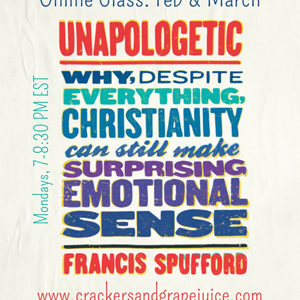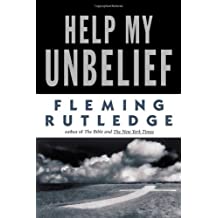What’s Next?
What’s next — well isn’t that something we’d all like to know . . .
 My response is of disappointingly limited scope, though in two parts. Part One: what’s next on the webinar schedule? A number of you signed up for and participated in the webinar on Francis Spufford’s UnApologetic. Some asked if our panel of non-experts would be following this webinar up with another?
My response is of disappointingly limited scope, though in two parts. Part One: what’s next on the webinar schedule? A number of you signed up for and participated in the webinar on Francis Spufford’s UnApologetic. Some asked if our panel of non-experts would be following this webinar up with another?
Yes! Our selected read is one of the several published collections of sermons by Fleming Rutledge, the one titled Help My UnBelief. It contains 34 sermons. I doubt we will read/ discuss every one, and will probably do two or three per session. Fleming is a brilliant preacher, and one whose sermons read well, which are two different things.
She frames the sermons in this collection as responses to common questions, as for example, “Doesn’t everybody have his or her own idea of God?,” “Isn’t Christianity about being good?,” “Didn’t St. Paul mess up the simple gospel of Jesus?,” “What if I’m not very religious?,” “What does the cross mean?,” and many more.
 The series will again be on Monday evenings or late afternoons (depending on your time zone), probably beginning on April 25. Keep an eye on my website for more information re registration etc.
The series will again be on Monday evenings or late afternoons (depending on your time zone), probably beginning on April 25. Keep an eye on my website for more information re registration etc.
Part Two of this “What’s Next?” takes us to the final chapter of Spufford’s book, titled “Consequences,” which was on our docket this past Monday. Use the link to get the tape of the session. Spufford asks, so if you join up in this Christian thing, however tentatively, what’s next?
He begins in a way consistent with the overall focus of the book on the emotional experience of faith by asking, “What does it feel like to feel yourself forgiven?” It is, he says, “surprising.” He compares it to a toothache stopping because a tooth removed was removed. “It has the numb surprisingness of something that hurt not being there anymore.”
Forgiveness, he continues, “has no price we need to pay, but it exposes our illusions of control. Forgiveness is not flattering. Forgiveness reminds us that our masks are masks.” And this, “Forgiveness starts something, if we let it.” There’s an openness we hadn’t imagined, a newness. “Forgiveness comes with an invitation to find out what else we may become that we hadn’t suspected.” I like that very much. It’s a truthful antidote to the idea that life is closed (perhaps especially felt as we age), or just one damn thing after another, that nothing much can ever change for the better about us or others.
Spufford talks about the move from the initial romance of faith to a more settled relationship of trust, about the command to love which is clear but also complicated. He speaks about faith’s implications for politics and how the church is probably blessed to have lost political power and clout. “Christianity is no one’s vehicle for ambition.” I think that may be largely true in the U.K., but less so in the U.S.
Still, there’s no party or policy that is “the Christian one.” But there is this: “You may not as a Christian endorse any politics that dismisses the HPtFtu. You’re committed to Jesus’s kind of pessimism, remember. Pictures of perfection are not for you. You can believe in human betterment to your heart’s content, according to whatever policy prescription strikes you as good, but you may not believe, ever, in humanity reaching a state where our wishes are all in mysterious harmony, and our hearts are all conveniently scrubbed and disinfected.”
Thank you, Jesus. Hopeful we are. Utopians we are not.
Oh, and you’re also not allowed to shun other Christians whose views you find maddening or personas repulsive. Ted Cruz again. Damn.
I’ll close with this from the chapter that I especially liked.
“Christianity says that human beings are neither perfect nor perfectible. The presumption of innocence is a useful rule in court cases, but not a sensible attitude for adults in general to take to adults in general. In comparison, Christianity says that both less and more is to be expected of people. Less because of our inevitably divided and thwarting selves; more because thanks to grace our identities are more provisional, more hopefully fluid, than we commonly acknowledge.”
I hope you enjoyed the book (if you read it; if you didn’t there’s still time.) I did, very much. And I hope you’ve found these weekly summaries useful and engaging.
Now about “What’s next?” in American politics, the War in Ukraine, the economy, the next election, your family problems or your love life. Okay, let’s now take those in order.
Sorry, April fool!
![Anthony B. Robinson [logo]](https://www.anthonybrobinson.com/wp-content/themes/anthonybrobinson/images/logo.png)
![Anthony B. Robinson [logo]](https://www.anthonybrobinson.com/wp-content/themes/anthonybrobinson/images/logo-print.png)